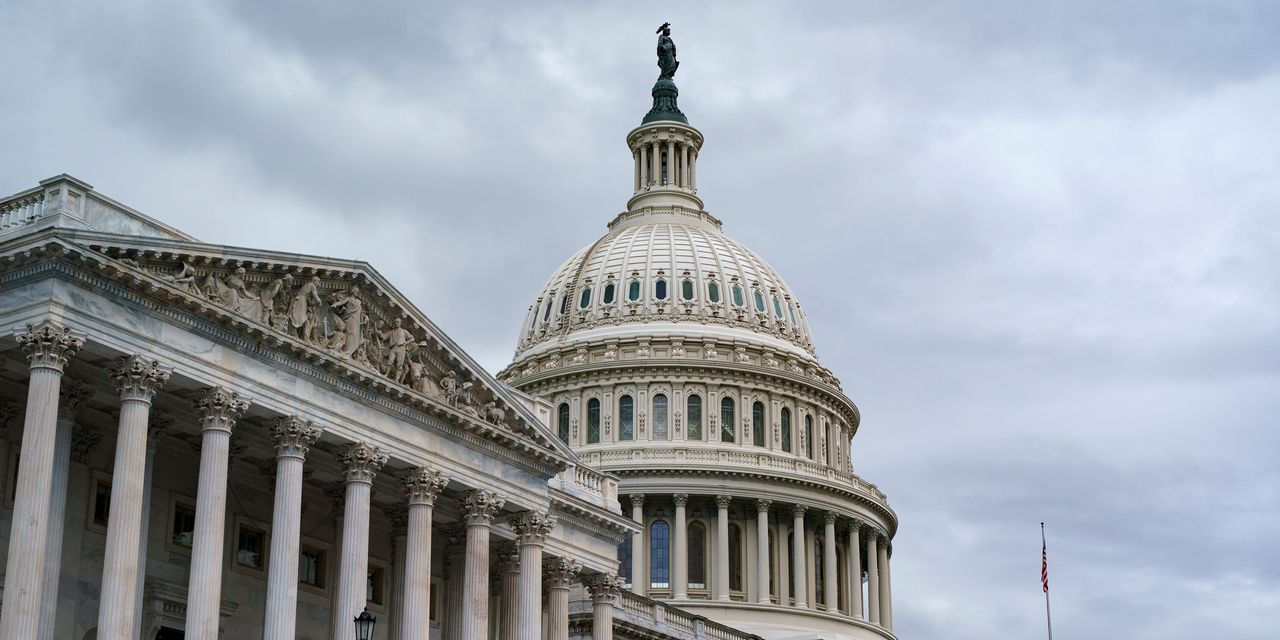
WASHINGTON—The House on Tuesday voted along party lines to raise the U.S. borrowing limit into December, as Democratic lawmakers wrestled with how to set a new ceiling for U.S. debt later this year over Republican resistance.
House Speaker Nancy Pelosi (D., Calif.) called the House back from a week away from Washington to pass the debt-ceiling increase that cleared the Senate last week. The early return followed a warning from Treasury Secretary Janet Yellen to House Democratic leaders that if the chamber failed to act this week, the U.S. wouldn’t be able to pay its bills. The White House has said that President Biden will sign the measure into law.
The bill would increase the debt ceiling by $480 billion, an amount that the Treasury Department has said would allow the U.S. to pay its bills through Dec. 3, assuming it had also exhausted all of its cash-conservation strategies. Goldman Sachs has projected that the money would last somewhat longer, though not past the end of the year, suggesting the U.S. has roughly two months before Congress must address the debt ceiling again.
On Tuesday, Mrs. Pelosi floated the idea of giving the Treasury secretary the power to raise the borrowing limit, an idea pushed by some House Democrats, but giving Congress the power to reject the increase. That is similar to an approach devised by Senate Minority Leader Mitch McConnell (R., Ky.) during the 2011 fiscal crisis, which ended with the 2011 Budget Control Act, a law that raised the debt ceiling in three stages, with the latter two increases subject to congressional disapproval.
“That seems to have some appeal to both sides of the aisle,” Mrs. Pelosi said.
SHARE YOUR THOUGHTS
What action should the House take on the debt limit? Join the conversation below.
A Senate Republican aide said that the Budget Control Act was part of a broad-ranging negotiation between then-Vice President Biden and Mr. McConnell that decreased spending, while Mrs. Pelosi is acting in the context of Democrats’ efforts to pass the largest spending increase in generations.
House Majority Leader Steny Hoyer (D., Md.) went further rhetorically, saying on the House floor that “we ought to think about eliminating this debt limit because all it does is have a threat to global instability.”
House Democrats, unified around raising the borrowing limit, is assured of enacting the measure into law because the House needs only a simple majority to pass legislation.
Even so, Democrats opted to raise the borrowing limit through a complicated procedure that deemed the measure to have passed when the House approved the rules governing the terms of debating some other bills. The legislation next heads to Mr. Biden’s desk for his signature. The rule was approved by 219-206.
In the Senate, Democrats and Republicans have sparred for months over the terms under which Congress would raise the debt ceiling, which has become a proxy for the fight over Democrats’ plans for the multitrillion dollar healthcare, education and climate-change bill.
The debt-limit increase doesn’t authorize new spending, but instead allows the government to meet existing obligations, including interest on the debt and payments to Social Security, Medicare and Medicaid.
Republicans had tried to force Democrats to use a complicated procedure called budget reconciliation to pass an increase with no help from the GOP. The reconciliation process allows the Senate to pass legislation related to spending, taxes or the debt limit with a simple majority, skirting the 60-vote threshold for most legislation. But it also could give the Republicans some tactical advantages.
The reconciliation process is more time-consuming than passing ordinary bills—requiring two separate sets of marathon amendment-vote sessions known as “vote-a-ramas.” This would eat up time Democrats would prefer to spend on Mr. Biden’s climate and social-welfare agenda. Republicans had also hoped that by forcing a debt-ceiling increase through reconciliation procedures, the legislative maneuver would tie Democrats to increasing the debt—instead of suspending the debt limit until December 2022.
Republicans and Democrats in the Senate are poised to dive back into the same debate when they return next week. Last week’s bitter fight worsened when Senate Majority Leader Chuck Schumer (D., N.Y.) criticized Republicans on the Senate floor for the debt-ceiling crisis, comments that inflamed Republican leaders, who had just quashed a rebellion within their own ranks to raise the borrowing limit.
Mr. McConnell called Mr. Biden Friday to privately discuss Mr. Schumer’s criticism, according to a Senate aide, and publicized his position in a separate letter to the president. “In light of Senator Schumer’s hysterics and my grave concerns about the ways that another vast, reckless, partisan spending bill would hurt Americans and help China, I will not be a party to any future effort to mitigate the consequences of Democratic mismanagement,’’ Mr. McConnell wrote.
That leaves open the question of how Congress will navigate a path forward. The Dec. 3 deadline for raising the debt ceiling coincides with the deadline for passing legislation to avoid a partial government shutdown.
Democrats could give in to Republican demands to use the reconciliation process to raise the debt limit. One possible opening could come from the Senate parliamentarian, who in her last guidance on including the debt ceiling through the existing reconciliation process explicitly reserved making a decision on that topic, according to a person familiar with the matter. That suggests that should Democrats ever formally seek a ruling, they could potentially win support for suspending the debt limit to a particular date and protect themselves from being associated with increasing the debt by a particular amount.
Democrats could also try again to pick up Republican support, even though the Senate’s top Republican said that he wouldn’t again line up the votes to increase the debt ceiling through the regular process.
Write to Siobhan Hughes at [email protected]
Copyright ©2021 Dow Jones & Company, Inc. All Rights Reserved. 87990cbe856818d5eddac44c7b1cdeb8








